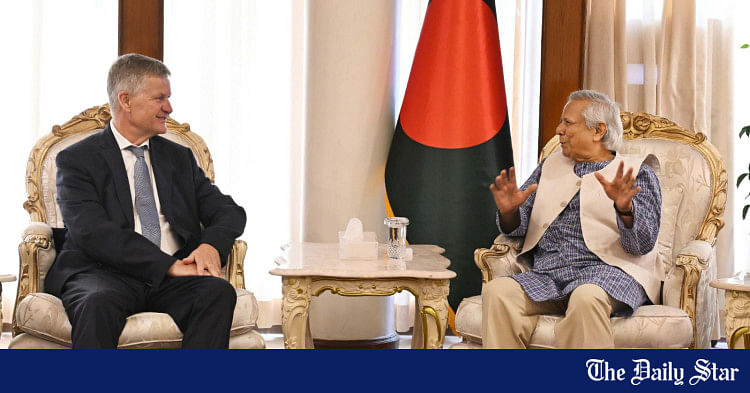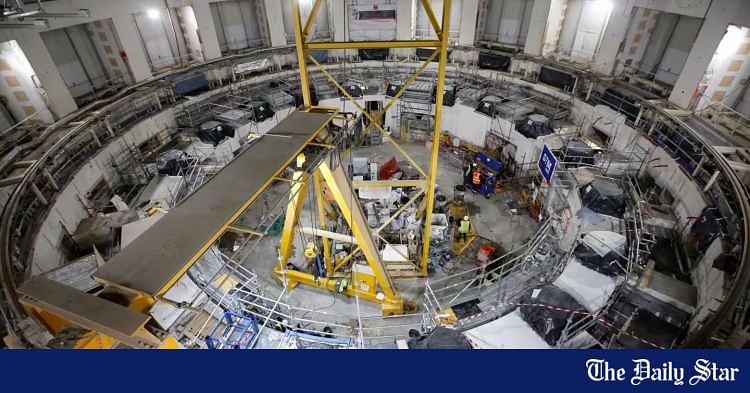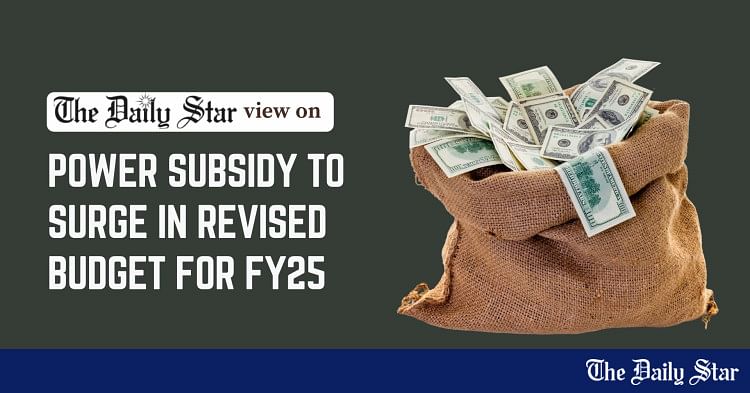- Copy to clipboard
- Thread starter
- #341
Saif
Senior Member
- Joined
- Jan 24, 2024
- Messages
- 15,397
- Reaction score
- 7,865
- Points
- 209
- Nation

- Residence

- Axis Group


Bangladesh can attract big investments in renewables
A delegation of development and renewable energy experts, led by a former Norwegian minister, called on Professor Muhammad Yunus, chief adviser to the interim government in Bangladesh, at a state guest house in Dhaka yesterday.
Bangladesh can attract big investments in renewables
Experts tell CA

Photo: CA's press wing
A delegation of development and renewable energy experts, led by a former Norwegian minister, called on Professor Muhammad Yunus, chief adviser to the interim government in Bangladesh, at a state guest house in Dhaka yesterday.
The team expressed their keen interest in investing in small-scale solar plants, the carbon market, and agroforestry in the country, as Bangladesh focuses more on moving away from fossil fuels in the coming years.
Professor Yunus welcomed the move, saying the interim government was now ready to attract foreign direct investment in these rapidly evolving sectors.
"All these are very serious issues for us. Bangladesh wants big investments in renewable energy and the carbon market," the chief adviser said.
Professor Yunus said Dhaka had already initiated talks to import hydroelectricity from Nepal and Bhutan, and his government was eager to explore opportunities to set up a South Asian grid to bring the power to Bangladesh via a narrow corridor in India.
"This (hydroelectricity in Nepal) is a treasure waiting to be explored.
But delivery is a problem," the chief adviser said.
The Norwegian minister for development and environment, Erik Solheim, also a former UN under-secretary-general, said Bangladesh lacks enough unused space for the construction of large-scale solar plants like those in China and other Asian countries.
However, he said the country could be a perfect place to set up small-scale solar plants.
Professor Yunus said his government has put special emphasis on solar plants and has already invited Chinese investors to relocate solar panel manufacturing plants to Bangladesh.
Representatives of several Chinese solar manufacturing firms have since visited Bangladesh to explore opportunities to set up factories here, with a view to using them to export much of their products to Western nations.
Kavin Kumar Kandasamy, chief executive officer of ProClime, a carbon trade and climate investment firm, said Bangladesh could easily earn tens of millions of dollars through carbon trading, as South Asian nations like Sri Lanka have done.
Professor Yunus said Bangladesh was very interested in exploring the carbon market, as it would help the country earn millions while also supporting efforts to protect the Sundarbans, the world's largest mangrove forest.
During the talks, the chief adviser and the Solheim-led delegation also discussed the Rohingya crisis and recent developments in the western Myanmar state of Rakhine, where a rebel group now controls most of the territory.
Experts tell CA
Photo: CA's press wing
A delegation of development and renewable energy experts, led by a former Norwegian minister, called on Professor Muhammad Yunus, chief adviser to the interim government in Bangladesh, at a state guest house in Dhaka yesterday.
The team expressed their keen interest in investing in small-scale solar plants, the carbon market, and agroforestry in the country, as Bangladesh focuses more on moving away from fossil fuels in the coming years.
Professor Yunus welcomed the move, saying the interim government was now ready to attract foreign direct investment in these rapidly evolving sectors.
"All these are very serious issues for us. Bangladesh wants big investments in renewable energy and the carbon market," the chief adviser said.
Professor Yunus said Dhaka had already initiated talks to import hydroelectricity from Nepal and Bhutan, and his government was eager to explore opportunities to set up a South Asian grid to bring the power to Bangladesh via a narrow corridor in India.
"This (hydroelectricity in Nepal) is a treasure waiting to be explored.
But delivery is a problem," the chief adviser said.
The Norwegian minister for development and environment, Erik Solheim, also a former UN under-secretary-general, said Bangladesh lacks enough unused space for the construction of large-scale solar plants like those in China and other Asian countries.
However, he said the country could be a perfect place to set up small-scale solar plants.
Professor Yunus said his government has put special emphasis on solar plants and has already invited Chinese investors to relocate solar panel manufacturing plants to Bangladesh.
Representatives of several Chinese solar manufacturing firms have since visited Bangladesh to explore opportunities to set up factories here, with a view to using them to export much of their products to Western nations.
Kavin Kumar Kandasamy, chief executive officer of ProClime, a carbon trade and climate investment firm, said Bangladesh could easily earn tens of millions of dollars through carbon trading, as South Asian nations like Sri Lanka have done.
Professor Yunus said Bangladesh was very interested in exploring the carbon market, as it would help the country earn millions while also supporting efforts to protect the Sundarbans, the world's largest mangrove forest.
During the talks, the chief adviser and the Solheim-led delegation also discussed the Rohingya crisis and recent developments in the western Myanmar state of Rakhine, where a rebel group now controls most of the territory.





















